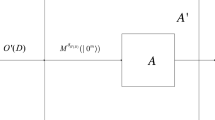Abstract
In cryptography, obfuscation is one of the strongest forms of encryption. Point functions have been widely discussed in classical obfuscation so that obfuscation of point functions becomes an important branch of obfuscation theory. For quantum circumstance, a series of positive results in quantum point obfuscation have been proposed and indicate that quantum point obfuscation is secure under the quantum random oracle model. Furthermore, how to realize quantum point obfuscation under the standard model becomes a key question. In this paper, we clarify the definition of instantiation of quantum point obfuscation and instantiate quantum point obfuscation by means of feasible construction of quantum hash functions. Consequently, we choose the quantum point obfuscation scheme with quantum error-correcting code and prove the security of the quantum symmetric encryption scheme. Such results will provide guidance to the application of quantum obfuscation in practice.



Similar content being viewed by others
Explore related subjects
Discover the latest articles, news and stories from top researchers in related subjects.References
Bennett, C.H.: Quantum cryptography: public key distribution and coin tossing. In: Proceedings of IEEE International Conference on Computers Institute of Electrical and Electronics Engineers, pp. 157–179 (1984)
Gottesman, D.: On the theory of quantum secret sharing. Phys. Rev. A 61(4), 042311 (1999)
Wang, C., Deng, F.G., Long, G.L.: Multi-step quantum secure direct communication using multi-particle Green–Horne–Zeilinger state. Opt. Commun. 253(1–3), 15–20 (2005)
Braunstein, S.L., Mann, A.: Measurement of the Bell operator and quantum teleportation. Phys. Rev. A 51(3), 1727–1730 (1995)
Chau, H.F.: Quantum-classical complexity-security tradeoff in secure multi-party computation. Phys. Rev. A 61(3), 167–169 (2000)
Boneh, D., Zhandry, M.: Quantum-secure message authentication codes. In: Proceedings of International Conference on the Theory & Applications of Cryptographic Techniques, pp. 592–608. Springer, Berlin (2013)
Haake, F.: Quantum Signatures of Chaos. Springer, Berlin (2001)
Shang, T., Liu, J.W.: Secure Quantum Network Coding Theory. Springer, Berlin (2020)
Alagic, G., Fefferman, B.: On quantum obfuscation. arXiv:1602.01771 (2016)
Lynn, B., Prabhakaran, M., Sahai, A.: Positive results and techniques for obfuscation. In: Proceedings of International Conference on Advances in Cryptology-Eurocrypt, pp. 20–39. Springer, Berlin (2004)
Barak, B., Goldreich, O., Impagliazzo, R., et al.: On the (im)possibility of obfuscating programs (extended abstract). J. ACM 59(2), 1–18 (2001)
Wee, H.: On obfuscating point functions. In: Proceedings of 37th Annual ACM Symposium on Theory of Computing, pp. 523–532 (2005)
Ran, C., Dakdouk, R.R.: Obfuscating point functions with multibit output. In: Proceedings of Theory and Applications of Cryptographic Techniques, International Conference on Advances in Cryptology, pp. 489–508. Springer, Berlin (2008)
Hada, S.: Secure obfuscation for encrypted signatures. In: Proceedings of International Conference on Theory and Applications of Cryptographic Techniques, pp. 92–112. Springer, Berlin (2010)
Bitansky, N., Ran, C.: On strong simulation and composable point obfuscation. J. Cryptol. 27(2), 317–357 (2010)
Shang, T., Chen, R.Y.L., Liu, J.W.: On the obfuscatability of quantum point functions. Quantum Inf. Process. 18(2), 55 (2019)
Chen, R.Y.L., Shang, T., Liu, J.W.: IND-secure quantum symmetric encryption based on point obfuscation. Quantum Inf. Process. 18(6), 16 (2019)
Moni, N., Moti, Y.: Universal one-way hash functions and their cryptographic applications. In: Proceedings of the 21th ACM Symposium on Theory of Computing, pp. 33–43 (1989)
Merkle, R.C.: One Way Hash Functions and DES, Lecture Notes in Computer Science, vol. 435, pp. 428–446. Springer, Berlin (1990)
Canetti, R., Goldreich, O., Halevi, S.: The random oracle methodology, revisited. J. ACM 51(4), 557–594 (2004)
Eaton, E.: Signature Schemes in the Quantum Random-Oracle Model. University of Waterloo, Waterloo (2017)
Ablayev, F., Vasiliev, A.: Cryptographic quantum hashing. Laser Phys. Lett. 11(2), 25202 (2014)
Ablayev, F., Ablayev, M., Vasiliev, A.: On the balanced quantum hashing. J. Phys. Confer. 681(1), 012019 (2016)
Holevo, A.S.: Bounds for the quantity of information transmitted by a quantum communication channel. Probl. Inf. Transm. 9(3), 3–11 (1973)
Nayak, A.: Optimal lower bounds for quantum automata and random access codes. In: Proceedings of 40th Annual Symposium on Foundations of Computer Science, pp. 369–377 (1999)
Nikolopoulos, G.M.: Applications of single-qubit rotations in quantum public-key cryptography. Phys. Rev. A 77(78), 032348 (2008)
Acknowledgements
This project was supported by the National Natural Science Foundation of China (Nos. 61971021, 61571024), Aeronautical Science Foundation of China (No. 2018ZC51016), and the National Key Research and Development Program of China (No. 2016YFC1000307) for valuable helps. The authors declare no conflict of interest.
Author information
Authors and Affiliations
Corresponding author
Additional information
Publisher's Note
Springer Nature remains neutral with regard to jurisdictional claims in published maps and institutional affiliations.
Rights and permissions
About this article
Cite this article
Zhang, Y., Shang, T., Chen, R. et al. Instantiation of quantum point obfuscation. Quantum Inf Process 21, 29 (2022). https://doi.org/10.1007/s11128-021-03379-4
Received:
Accepted:
Published:
DOI: https://doi.org/10.1007/s11128-021-03379-4




